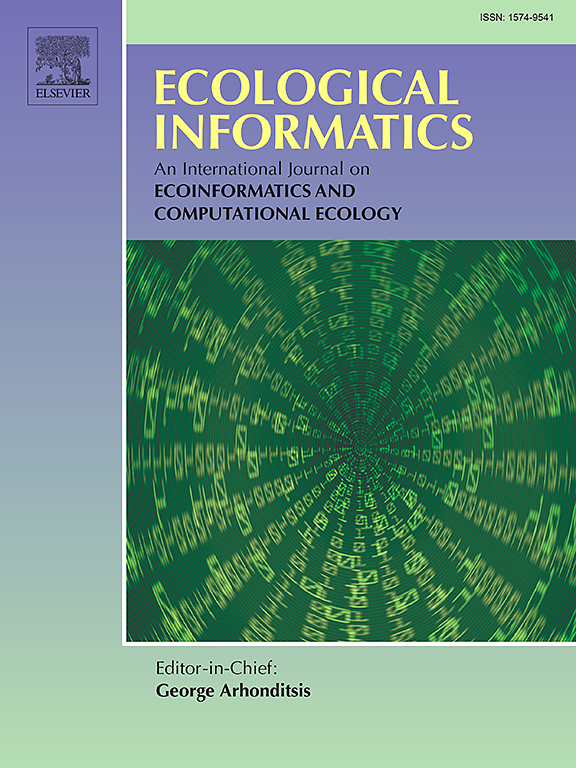生态系统(VI)2SE:专家-计算机视觉集成的视觉珊瑚状态探测
IF 5.8
2区 环境科学与生态学
Q1 ECOLOGY
引用次数: 0
摘要
冷水珊瑚礁及其相关栖息地具有高度的生态相关性,并受到各种人为压力的影响。因此,能够评估冷水珊瑚礁的生物多样性和健康状况是非常重要的。一个大规模评估多种冷水珊瑚礁的web应用程序将提高我们对这些压力源影响的理解,并为未来规划与这些珊瑚礁有关的人类活动提供重要的知识基础。在这项工作中,我们提出了一种新的计算方法来分析冷水珊瑚礁健康状况评估中77小时ROV视频的瓶颈问题。通过结合领域专家知识,最先进的深度学习图像分割和信息可视化,我们开发了一个高效和可持续的工作流程,用于连续分析冷水珊瑚的视觉监测数据。深度学习分割网络检测并分割测试集中背景中的pertusum desmoophyllum, Paragorgia arborea,其他柳橙和海绵,在水质和海洋雪波动的情况下,其相交union值分别为(81.77%,85.64%,63.64%,40.5%,96.13%)。与现场人员的人工ROV视频评估结果相比,计算方法的结果与基于专家的评估结果相吻合。本文章由计算机程序翻译,如有差异,请以英文原文为准。
ECO(VI)2SE: Expert-computer vision integration for visual coral status exploration
Cold-water coral reefs and associated habitats are of high ecological relevance and are subject to a diverse spectrum of anthropogenic stressors. Consequently, being able to evaluate the biodiversity and health status of cold-water coral reefs is of high importance. A web application for large-scale assessment of multiple cold-water coral reefs would improve our understanding of the effects of these stressors, and provide an important knowledge base for future planning of human activities in relation to these reefs. In this work, we present a new computational approach to the bottleneck problem of analyzing 77 h of ROV video from cold-water coral reef health status assessments. By combining domain expert knowledge, state-of-the-art deep learning image segmentation and information visualization, we have developed an efficient and sustainable workflow for analyzing visual cold-water coral monitoring data on a continuous basis. The deep learning segmentation network detected and segmented Desmophyllum pertusum, Paragorgia arborea, other gorgonians and sponges from the background in the test set with an intersection over union values of (81.77%, 85.64%, 63.64%, 40.5%, 96.13%) despite fluctuations in water quality and marine snow. Comparisons with manual ROV video evaluations from field personnel showed that the results from the computational approach correlated with the expert-based assessment.
求助全文
通过发布文献求助,成功后即可免费获取论文全文。
去求助
来源期刊

Ecological Informatics
环境科学-生态学
CiteScore
8.30
自引率
11.80%
发文量
346
审稿时长
46 days
期刊介绍:
The journal Ecological Informatics is devoted to the publication of high quality, peer-reviewed articles on all aspects of computational ecology, data science and biogeography. The scope of the journal takes into account the data-intensive nature of ecology, the growing capacity of information technology to access, harness and leverage complex data as well as the critical need for informing sustainable management in view of global environmental and climate change.
The nature of the journal is interdisciplinary at the crossover between ecology and informatics. It focuses on novel concepts and techniques for image- and genome-based monitoring and interpretation, sensor- and multimedia-based data acquisition, internet-based data archiving and sharing, data assimilation, modelling and prediction of ecological data.
 求助内容:
求助内容: 应助结果提醒方式:
应助结果提醒方式:


